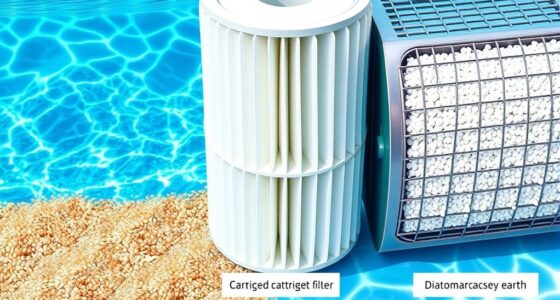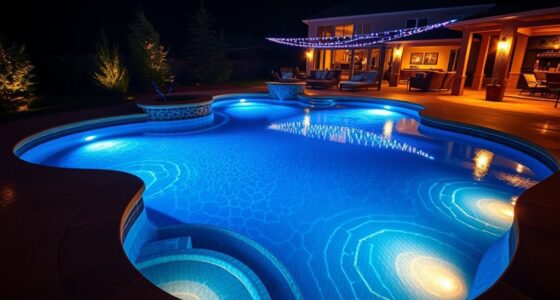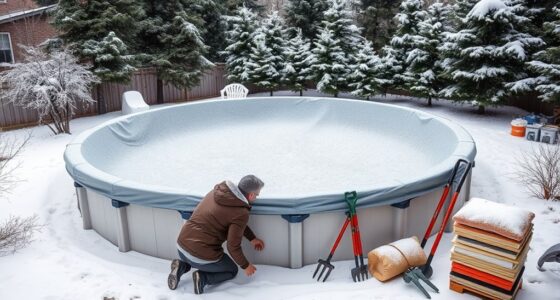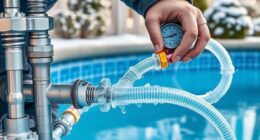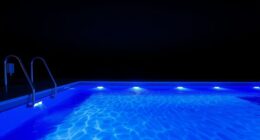To understand pool water chemistry, focus on balancing pH, alkalinity, and hardness. Keep pH between 7.2 and 7.8 to prevent irritation and cloudy water. Maintain alkalinity around 80-120 ppm to stabilize pH levels. Also, monitor calcium hardness to avoid scale or corrosion. Regular testing helps you catch imbalances early, ensuring safe, clear water. If you want to learn how to keep your pool perfectly balanced, stay with us for more helpful tips.
Key Takeaways
- pH measures water acidity or alkalinity, ideally between 7.2 and 7.8 for safe swimming.
- Alkalinity buffers pH fluctuations, with a recommended range of 80-120 ppm.
- Hardness refers to calcium levels; proper hardness prevents scaling and water cloudiness.
- Regular testing of pH, alkalinity, and hardness helps maintain balanced, safe pool water.
- Adjusting these levels prevents equipment damage, enhances swimmer comfort, and prolongs pool life.
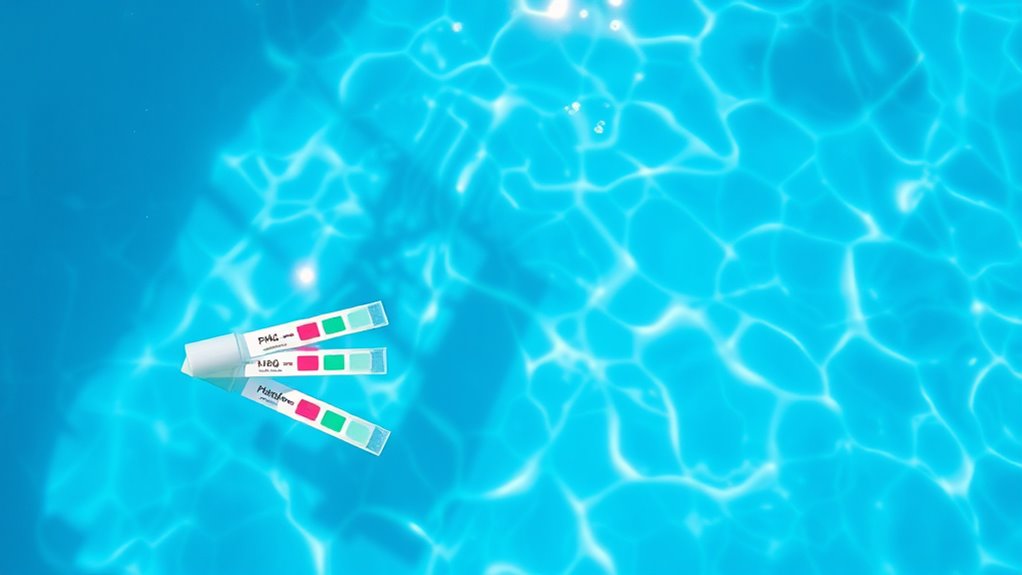
Maintaining balanced pool water chemistry is essential for safe and enjoyable swimming. When your water is properly balanced, it not only feels better but also helps prevent damage to your pool equipment and reduces skin and eye irritation. To achieve this, you need to focus on water balancing, which involves maintaining the correct pH, alkalinity, and hardness levels. A key part of this process is regular chemical testing, which allows you to monitor your water’s condition accurately.
Chemical testing is your first step in guaranteeing your pool water stays healthy. Using test kits or digital testers, you can quickly check levels of pH, alkalinity, and calcium hardness. These tests are simple but vital, giving you real-time information about your water’s chemistry. When you test, make sure to follow the instructions carefully to get accurate readings. Regular testing—at least once a week—is recommended, especially during peak swimming season when water chemistry can fluctuate more rapidly due to usage and weather conditions. Proper testing helps you identify imbalances early, so you can make adjustments before problems become severe. Understanding water chemistry is crucial for effective pool maintenance.
Regular testing of pH, alkalinity, and calcium hardness ensures a healthy, balanced pool water chemistry.
Water balancing starts with understanding and controlling pH. The ideal pH range for pool water is typically between 7.2 and 7.8. When the pH is too low, your water becomes acidic, which can cause corrosion of pool equipment, etching of the plaster surface, and skin or eye irritation. On the other hand, a high pH makes the water alkaline, leading to cloudy water, scale buildup, and reduced effectiveness of sanitizers. To keep your pH in check, you’ll need to add pH increasers or decreasers based on your test results. This constant adjustment guarantees your water remains comfortable and safe.
Alkalinity acts as a buffer, stabilizing the pH and preventing sudden swings. Maintaining alkalinity within the recommended range, usually between 80 and 120 ppm, keeps your pH steady over time. If alkalinity is too low, your pH can become unstable, bouncing between acidic and alkaline. If it’s too high, it can make pH adjustments more difficult and promote scale formation. To correct alkalinity levels, you’ll add alkalinity increasers or decreasers, and again, testing is vital to determine the right amount. Regular monitoring and adjusting of alkalinity help create a stable environment for your pool water chemistry.
Frequently Asked Questions
How Often Should I Test My Pool Water?
You should test your pool water at least twice a week to ensure proper water balancing. Regular pool testing helps you monitor pH, alkalinity, and hardness levels, preventing issues like cloudy water or algae growth. If you notice heavy usage or after storms, test more frequently. Keeping a consistent testing schedule allows you to make quick adjustments, maintaining safe, clean, and balanced pool water for enjoyable swimming.
What Are the Signs of Imbalanced Pool Water?
A stitch in time saves nine, so watch for signs of imbalanced pool water. If your water appears cloudy, has a strong chemical smell, or causes skin and eye irritation, your pool water stability is likely compromised. You might also notice poor chlorine efficiency, leading to algae growth or algae blooms. Regular testing and adjustments help maintain the right balance, ensuring your pool stays clean, safe, and inviting.
Can High Ph Cause Skin Irritation?
Yes, high pH can cause skin irritation because pH fluctuation affects how your skin reacts to pool water. When pH levels are too high, your skin becomes dry, itchy, and sensitive, especially if you have skin sensitivity. It also reduces chlorine’s effectiveness, making irritation worse. To avoid this, regularly test and adjust your pool’s pH, keeping it balanced to protect your skin and maintain comfortable swimming conditions.
How Does Water Hardness Affect Pool Equipment?
Ever wonder how water hardness impacts your pool equipment? When water is too hard, it can lead to scale formation on filters and heaters, reducing efficiency. Conversely, very soft water may cause equipment corrosion. Maintaining proper hardness levels prevents these issues, ensuring your pool runs smoothly. Keep an eye on water hardness to protect your investment and enjoy crystal-clear, well-maintained water all season long.
What Are Natural Ways to Balance Pool Water Chemistry?
You can naturally balance your pool water by promoting natural filtration and mineral balancing. Regularly run your filter to remove debris and contaminants, supporting natural filtration. Add natural mineral balancers, like magnesium or calcium, to maintain ideal hardness levels without chemicals. You might also use beneficial bacteria or enzymes to reduce organic buildup, helping to stabilize pH and alkalinity naturally. These methods keep your water clear and healthy without harsh chemicals.
Conclusion
By understanding the delicate balance of pH, alkalinity, and hardness, you hold the key to a sparkling, inviting pool. When you nurture these elements, you’re not just maintaining water—you’re creating a sanctuary for memories and relaxation. Think of your pool as a mirror reflecting your care and attention; neglect it, and its beauty fades. So, take charge with confidence, and let your pool shine as a demonstration of your dedication and love.


